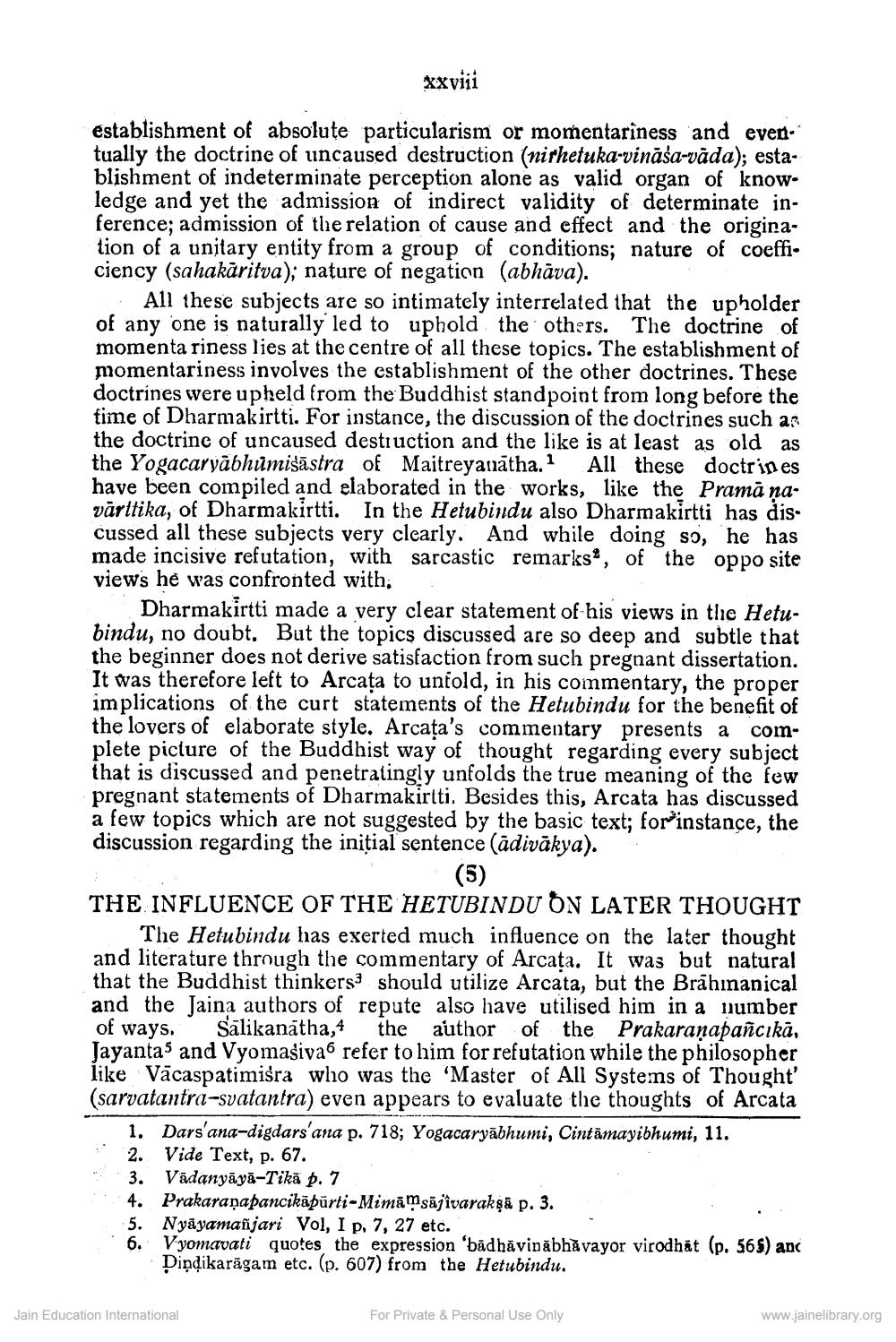________________
xxviii
establishment of absolute particularism or momentarîness and even." tually the doctrine of uncaused destruction (nirhetuka-vināša-vāda); establishment of indeterminate perception alone as valid organ of knowledge and yet the admission of indirect validity of determinate inference; admission of the relation of cause and effect and the origination of a unitary entity from a group of conditions; nature of coeffi. ciency (sahakaritva); nature of negation (abhāva).
All these subjects are so intimately interrelated that the upholder of any one is naturally led to uphold the others. The doctrine of momenta riness lies at the centre of all these topics. The establishment of momentariness involves the establishment of the other doctrines. These doctrines were upheld from the Buddhist standpoint from long before the time of Dharmakirtti. For instance, the discussion of the doctrines such as the doctrine of uncaused destruction and the like is at least as old as the Yogacaryabhumisāstra of Maitreyanātha. All these doctrines have been compiled and elaborated in the works, like the Pramā navārttika, of Dharmakirtti. In the Hetubindu also Dharmakirtti has discussed all these subjects very clearly. And while doing so, he has made incisive refutation, with sarcastic remarks, of the opposite views he was confronted with
Dharmakirtti made a very clear statement of his views in tlie Hetubindu, no doubt. But the topics discussed are so deep and subtle that the beginner does not derive satisfaction from such pregnant dissertation. It was therefore left to Arcata to unfold, in his commentary, the proper implications of the curt statements of the Hetubindu for the benefit of the lovers of elaborate style. Arcata's commentary presents a complete picture of the Buddhist way of thought regarding every subject that is discussed and penetratingly unfolds the true meaning of the few pregnant statements of Dharmakirtti. Besides this, Arcata has discussed a few topics which are not suggested by the basic text; for instance, the discussion regarding the initial sentence (ādivākya).
(5) THE INFLUENCE OF THE HETUBINDU ON LATER THOUGHT
The Hetubindu has exerted much influence on the later thought and literature through the commentary of Arcata. It was but natural that the Buddhist thinkers should utilize Arcata, but the Brāhinanical and the Jaina authors of repute also have utilised him in a number of ways. Salikanātha, the author of the Prakaranapañcikā, Jayanta5 and Vyomašiva6 refer to him for refutation while the philosopher like Vācaspatimisra who was the 'Master of All Systems of Thought' (sarvatantra-svatantra) even appears to evaluate the thoughts of Arcata
1. Dars'ana-digdars'ana p. 718; Yogacaryābhumi, Cintāmayibhumi, 11. 2. Vide Text, p. 67. 3. Vādanyāyā-Tikā p. 7 4. Prakaranapancikāpārti-Mimāsājîvaraksā p. 3. 5. Nyāyamasjari Vol, I p, 7, 27 etc. 6. Vyomavati quotes the expression 'bādhāvinābhavayor virodhät (p. 56S) and
Dindikarāgam etc. (p. 607) from the Hetubindu.
Jain Education International
For Private & Personal Use Only
www.jainelibrary.org




